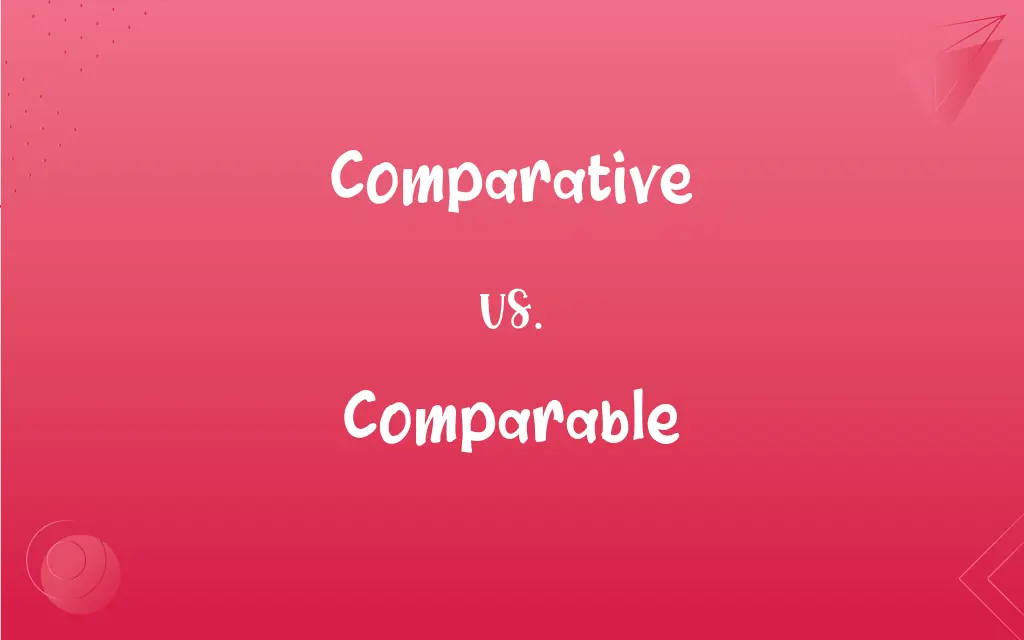Comparative vs. Comparable: What's the Difference?
Edited by Harlon Moss || By Janet White || Updated on September 28, 2023
Comparative pertains to the act of comparing and often involves degrees of quality, while comparable means capable of being compared due to similar attributes or characteristics.

Key Differences
Comparative and comparable, while seemingly related due to their common root, serve different linguistic and conceptual functions. "Comparative" primarily refers to the grammatical construct used to compare the degrees of quality between two entities, such as in the formation of comparative adjectives like "bigger" or "more interesting." It denotes a relation based on similarities and differences identified through comparison. In contrast, "comparable" is an adjective that describes the ability or suitability of two or more entities to be compared, often because they possess similar characteristics or attributes, for example, when two products have similar features making them comparable.
The term "comparative" can also denote a method of study or analysis that investigates and evaluates the similarities and differences between subjects. For instance, comparative literature studies analyze the literary works of different cultures to discern shared themes and differing cultural nuances. "Comparable," on the other hand, implies that items or concepts have enough in common to warrant comparison, such as comparable salaries, indicating that the salaries in question are similar enough in amount or structure to be considered alongside each other.
In grammar, a "comparative" is a syntactical form or structure used to express a higher degree of a certain quality between two objects or concepts, usually by modifying an adjective or adverb, for example, "stronger" or "more quickly." It's a mechanism to denote relative distinction based on a specific characteristic. Conversely, "comparable" is utilized to describe objects or concepts that share enough common ground or similarities to be legitimately juxtaposed or assessed against each other, often to evaluate their value, efficiency, or effectiveness.
While "comparative" is often associated with linguistic structures and analytical methodologies focusing on relative distinctions and evaluations, "comparable" is inherently descriptive, characterizing objects or concepts as suitable for comparison due to shared characteristics or equivalencies. When speaking of comparative advantage in economics, one discusses the ability of an entity to produce goods or services at a lower opportunity cost than others, allowing for analysis and strategic planning. In contrast, when two real estate properties are said to be comparable, it denotes that they share similar features, locations, or sizes, and can be assessed or valued against each other.
Conclusively, "comparative" is typically associated with the act or process of comparing and analyzing relative distinctions, whereas "comparable" denotes the inherent suitability or capability of being compared, emphasizing shared attributes or equivalencies.
ADVERTISEMENT
Comparison Chart
Definition
Pertaining to the act of comparing and involves degrees of quality.
Capable of being compared due to similarities
Function
Analytical, evaluates relative distinctions
Descriptive, indicates suitability for comparison
Usage
Grammar, analysis, methodology
Describing similarity between objects or concepts
Implies
Relation based on identified similarities and differences
Presence of similar attributes or characteristics
Application
Comparative adjectives, comparative studies, comparative analysis
Describing products, services, values, etc.
ADVERTISEMENT
Comparative and Comparable Definitions
Comparative
Involving or based on a comparison to determine the relative position or standing.
Comparative studies in economics are essential for policy-making.
Comparable
Corresponding in function, but not evolutionary derived from an equivalent organ.
The wings of bats and birds are comparable structures.
Comparative
(In grammar) Indicating the degree of adjective or adverb quality between two entities.
Smarter is the comparative form of smart.
Comparable
Able to be likened to another; similar.
These two fabrics are comparable in quality.
Comparative
Involving the examination of the similarities and differences between two or more things.
Comparative literature explores texts from different cultures.
Comparable
Equivalent in extent, amount, or degree.
The risks involved in the two investments are comparable.
Comparative
Relating to, based on, or involving comparison.
Comparable
Capable of being compared; having features in common.
The growth rates of the two plants are comparable.
Comparative
Of or relating to the scientific or historical comparison of different phenomena, institutions, or objects, such as languages, legal systems, or anatomical structures, in an effort to understand their origins or relationships.
Comparable
Admitting of comparison with another or others
“The satellite revolution is comparable to Gutenberg's invention of movable type” (Irvin Molotsky).
Comparative
Estimated by comparison; relative
A comparative newcomer.
Comparable
Similar or equivalent
Pianists of comparable ability.
Comparative
(Grammar) Of, relating to, or being the intermediate degree of comparison of adjectives, as better, sweeter, or more wonderful, or adverbs, as more softly.
Comparable
(often with to) Able to be compared (to).
An elephant is comparable in size to a double-decker bus.
You can't say that robbing a bank is like pickpocketing. The two are just not comparable.
Comparative
The comparative degree.
Comparable
(often with to) Similar (to); like.
Comparative
An adjective or adverb expressing the comparative degree.
Comparable
(mathematics) Constituting a pair in a particular partial order.
Six and forty-two are comparable in the divides order, but six and nine are not.
Comparative
Of or relating to comparison.
Comparable
(grammar) Said of an adjective that has comparative and superlative forms.
"Big" is a comparable adjective, since it can take the forms "bigger" and "biggest"; but "unique" is not comparable, except in disputed, but common, usage.
Comparative
Using comparison as a method of study, or founded on something using it.
Comparative anatomy
Comparable
Something suitable for comparison.
Comparative
Approximated by comparison; relative.
Comparable
Capable of being compared; worthy of comparison.
There is no blessing of life comparable to the enjoyment of a discreet and virtuous friend.
Comparative
(obsolete) Comparable; bearing comparison.
Comparable
Able to be compared or worthy of comparison
Comparative
(grammar) A construction showing a relative quality, in English usually formed by adding more or appending -er. For example, the comparative of green is greener; of evil, more evil.
Comparable
Conforming in every respect;
Boxes with corresponding dimensions
The like period of the preceding year
Comparative
(grammar) A word in the comparative form.
Comparable
Suitable for comparison in terms of quality or quantity.
The services provided by the two companies are not comparable.
Comparative
Data used to make a comparison.
Comparative
(obsolete) An equal; a rival; a compeer.
Comparative
(obsolete) One who makes comparisons; one who affects wit.
Comparative
Of or pertaining to comparison.
Comparative
Proceeding from, or by the method of, comparison; as, the comparative sciences; the comparative anatomy.
Comparative
Estimated by comparison; relative; not positive or absolute, as compared with another thing or state.
The recurrence of comparative warmth and cold.
The bubble, by reason of its comparative levity to the fluid that incloses it, would necessarily ascend to the top.
Comparative
Expressing a degree greater or less than the positive degree of the quality denoted by an adjective or adverb. The comparative degree is formed from the positive by the use of -er, more, or less; as, brighter, more bright, or less bright.
Comparative
The comparative degree of adjectives and adverbs; also, the form by which the comparative degree is expressed; as, stronger, wiser, weaker, more stormy, less windy, are all comparatives.
In comparatives is expressed a relation of two; as in superlatives there is a relation of many.
Comparative
An equal; a rival; a compeer.
Gerard ever wasHis full comparative.
Comparative
One who makes comparisons; one who affects wit.
Comparative
The comparative form of an adjective;
`better' is the comparative of `good'
Comparative
Relating to or based on or involving comparison;
Comparative linguistics
Comparative
Having significance only in relation to something else;
A comparative newcomer
Comparative
Relating to or based on comparison.
Comparative analysis is crucial for understanding diverse cultures.
Comparative
Used to express a relation of resemblance or equality between two entities.
The comparative data between the two studies is enlightening.
FAQs
Is comparable an adjective?
Yes, comparable is an adjective that describes the ability of two or more things to be compared.
Can comparative be used in grammar?
Yes, in grammar, comparative is used to compare the degrees of quality between two entities.
Does comparable imply similarity?
Yes, comparable implies that objects or concepts have enough similarity to be assessed or valued against each other.
Does comparative refer to a method of study?
Yes, comparative often refers to a method of study that involves analyzing the similarities and differences between subjects.
Can two products be comparable in quality?
Yes, two products can be comparable in quality if they share similar attributes or characteristics.
Can comparative be used to describe the degree of risk?
Yes, comparative can be used to describe and analyze the degree of risk between different options or activities.
Can things be comparable in degree?
Yes, things can be comparable in degree if they share a similar level or extent in a certain aspect.
Are comparative adjectives used to compare two things?
Yes, comparative adjectives are used to express the higher or lower degrees of a quality between two things.
Is comparative analysis used in various academic disciplines?
Yes, comparative analysis is a method used in various disciplines to study the relationships between different subjects.
Can comparative data provide insights?
Yes, comparative data can provide valuable insights by highlighting similarities and differences between different sets of data.
Can comparable properties have different values?
Yes, comparable properties can have different values but share enough features to warrant a comparison.
Does a comparative adjective often end in “-er”?
Yes, many comparative adjectives in English are formed by adding “-er” to the original adjective, like “faster” or “stronger.”
Is the comparative form used to indicate relative position?
Yes, the comparative form is often used to indicate the relative position or standing of an entity in comparison to another.
Is comparable related to equivalent features or characteristics?
Yes, comparable denotes the presence of equivalent or similar features or characteristics between objects or concepts.
Can comparable be used to describe services?
Yes, comparable can be used to describe services that share similar qualities or standards.
About Author
Written by
Janet WhiteJanet White has been an esteemed writer and blogger for Difference Wiki. Holding a Master's degree in Science and Medical Journalism from the prestigious Boston University, she has consistently demonstrated her expertise and passion for her field. When she's not immersed in her work, Janet relishes her time exercising, delving into a good book, and cherishing moments with friends and family.
Edited by
Harlon MossHarlon is a seasoned quality moderator and accomplished content writer for Difference Wiki. An alumnus of the prestigious University of California, he earned his degree in Computer Science. Leveraging his academic background, Harlon brings a meticulous and informed perspective to his work, ensuring content accuracy and excellence.
































































